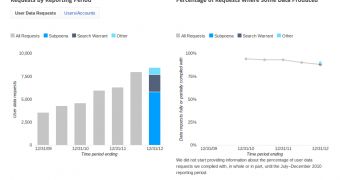Google isn't impressed by what Facebook and Microsoft were able to reveal regarding user data requests from the government. In fact, it believes it's a step back for users, as far as it's concerned.
“We have always believed that it’s important to differentiate between different types of government requests,” Google said in a statement.
“We already publish criminal requests separately from National Security Letters. Lumping the two categories together would be a step back for users. Our request to the government is clear: to be able to publish aggregate numbers of national security requests, including FISA disclosures, separately,” it added.
Google was the first to create a transparency report in which it discloses how many requests it gets from governments around the world, how many users are affected, and how many of those requests it complies with.
But the report only covers public requests. For a while now, Google has been fighting for the right to release stats on secret requests as well.
It won a small victory earlier this year when it was allowed to disclose an approximate number of how many FBI National Security Letters it receives. But FISA court requests have been off the table so far.
Behind the scenes, Google and everyone else is negotiating intensely. But it's anyone's guess whether Google will be able to get more from the government than what Facebook and Microsoft did.
There's another catch, however. Since Google already discloses a lot of data, if it was to disclose even a rough number of the total, it would be easy to figure out how many of those are secret FISA court orders.
Facebook and Microsoft, while disclosing these rough numbers, continued to ask for even greater transparency and the possibility to reveal exactly how many secret orders they get and how many users they affect.

 14 DAY TRIAL //
14 DAY TRIAL //